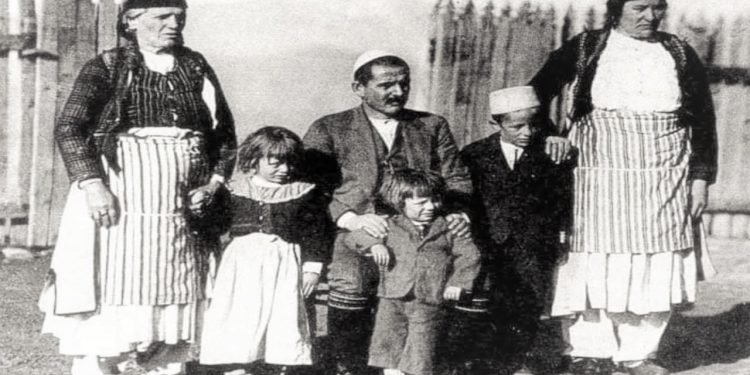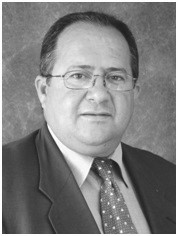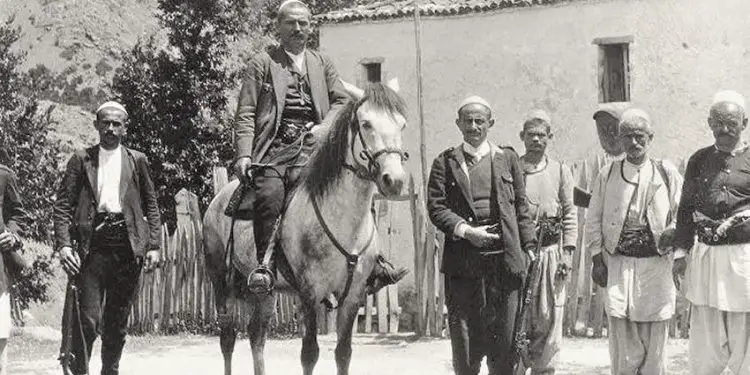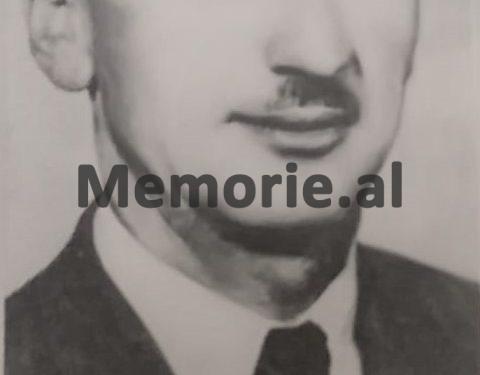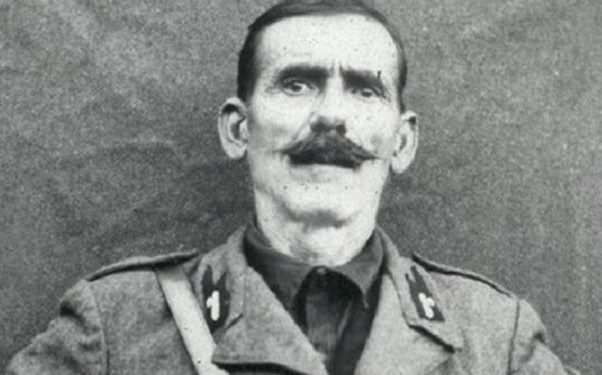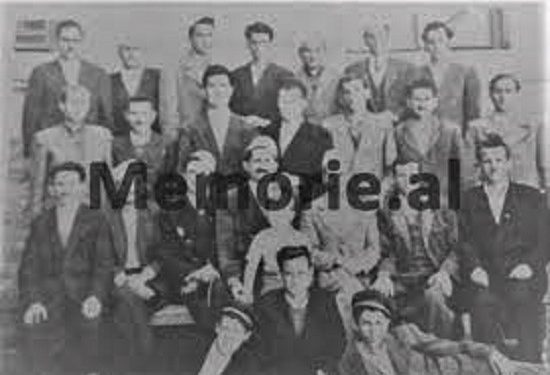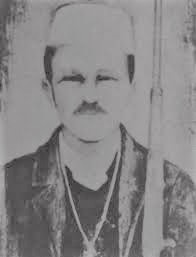By Martin Dedaj
– Preng Dodë Gjini (Gjikeqi) and his activity in the anti-communist resistance groups in the Mirdita Mountains-
Memorie.al / Preng Dodë Gjini, has been and will remain one of the most prominent activists of the anti-communist resistance of the period 1944-1953, in the province of Mirdita and beyond, thus exalting the name of his origin from a tribal family and by name in the village of Malaj, whose lands are located in Kamec, at the foot of Guri i Zit in the district of Mirdita. The activity of this brave and wise man goes beyond the borders of his hometown, to extend to the entire Bajrak of Kthella and all of Mirdita.
The beginnings of the anti-communist resistance…!
Seeing the progress of the Communist Party in the South of the country, the anti-communist resistance had started long ago with a group of leaders from the villages of Upper Albania, who on April 2, 1944, created the “Independent Group” in Shkodër, with a Steering Council of consisting of: Sulçe Beg Bushati, Gjon Marka Gjoni, and Hafiz Ali Kraja, representing Shkodra, Mirdita, Malsina e Madhe, Dukagjin, Puka, Hasi, etc.
This group called on the nationalist forces of the “National Front” and “Legality” to unite in a single front of anti-communist resistance. Acknowledging that the National Liberation War was right and that at the end of November 1944, Albania was liberated, we must highlight the fact that, in the span of one year, clarification and confusion, salvation and loss, victory and defeat, they got so bad with each other that with the establishment of the communist dictatorship in Albania, their consequences would weigh heavily and for a long time on the conscience, life and existence of the people.
More than any other province, Mirdita suffered on its shoulders the most severe persecution and salvation of the communist dictatorship. “Submit Mirdita and all the areas that are against us”, was the motto of the communist government, which had just begun to be installed in Albania. A special circular gave the punishment squads the right to use any kind of torture, including extrajudicial executions. Meanwhile, the persons who presented “danger” to the communist government, which was being installed in Albania, had begun to be identified.
It didn’t take long and the first executions began. Dodë Preng Kola was executed at the Kodër Rrëshen Church, two weeks later Gjon Pjetër Maca, (in Përlat-Cendër), to continue with murders and other deportations by the so-called “Following Forces” which were led by the curvaceous Hodo Habibi, known as “Lieutenant Baba”.
In these circumstances, to oppose the communist regime and its reprisals, on March 22, 1945, the “National Association of the Mountains” was created, with Mark Gjonmark as its chairman. The member and main leader of this connection was also the kthellasi Preng Dod Gjini, whose purpose and task was the organization of the Anti-Communist Resistance Front in Malaj, Kthella, Mirdita and beyond.
Preng Dodë Gjini, an important part of the Albanian anti-communist resistance
After November 1944, the Bajraks of Mirdita, encouraged by their leaders, organized and formed anti-communist resistance groups in all their provinces. Initially, the cores of the groups were created, which would then increase the ranks and unify the actions in the anti-communist resistance that was carried out in Mirdita, for nearly 10 years (1944-1953). In this resistance, the activity and anti-communist activity of Preng Dod Gjin, has been very active and decisive in its organization and progress, in the Bajrak of Kthella and beyond.
The activity that has its beginnings, from the organization of the first anti-communist nuclei, to continue with the creation of the “Resistance Group” for the Kthella Bajrak, which consisted of: Frrok Melyshi, Preng Dodë Gjini, Marka Dod Gjini, Llesh Tarazhi, Marka Cara, Zef Lekgega, Gjin Kros Buna, Preng Ruçi, etc., to join you later in the great Anti-Communist Resistance Front. The anti-communist resistance groups operating in the mountains of Mirdita kept increasing, not only in Mirdita, but also in other provinces of Albania, extending as far as Elbasan and Vlora.
In these circumstances, the leader of Mirdita, Mark Gjomarkaj, had entered into contact and communication with other leaders of the anti-communist resistance in different regions of the country, and on March 25, 1945, at Malin e Zepa in Mirdita, a very important meeting which had as its purpose: the organization and unification of the anti-communist resistance. In this meeting, which lasted two days, the representatives of the bajraqs of Mirdita, Luma, Dibra, Mati, Kruja, Kurbini, Mata Beach, Puka, etc. participated. Preng Dodë Gjini, together with Frrok Melyshin, represented the Bajrak of Kthella in this meeting. At the end of the meeting, this meeting received the name: “National Mountain Association”.
After this meeting, Mark Gjomakaj invited the heads of the 12-bajraqs of Mirdita and formed the “Interprovincial Committee of Mirdita”, with a Steering Council, consisting of: Llesh Preng Marku, Ndue Bajraktari, Frrok Melyshi, Marka Jak Bajraktari, Preng Dodë Gjini, Pjetër Llesh Gjoni, Mark Dod Gjini, Gjon Dodani, Ndrec Lufi, all outstanding fighters of the anti-communist resistance. Mark Gjomarkaj was elected chairman of this committee. This committee later organized its two sub-branches, one military and the other administrative and political, where Preng Dod Gjini was assigned to be in the Military sub-committee.
On May 6, 1946, Preng Dod Gjini, participated in another meeting, which took place in Rrasa i Bardhë in Kthella, where, in addition to representatives of the 12 bajraqs of Mirdita, representatives from other provinces of the country also participated. There was a discussion about the activity and the state in which the people were under the regime of the missionaries of partisanship, being dispersed determined to continue their mission and it was decided that the next meeting would take place on May 29, 1946, in Tjegulla i Prosek in Sober. Most of the freedom fighters in the mountains joined there and it was decided that the next meeting would be held here on June 15, 1946.
Before this meeting, on May 31, 1946, the Anti-Communist Resistance Headquarters was located in the Uja forest in Prosek, where they were welcomed and supplied by the generous and noble inhabitants of this area. There, the organization and actions that would be carried out in the 12 volunteer battalions of Mirdita bajraqs were theoretically elaborated, as well as the commanders of the battalions and companies and other leaders were appointed, who would lead the forces of the volunteer battalions in the revolution against the communist dictatorship.
The State Security Forces, with the help of some espionage within the “Anti-Communist Resistance Group”, managed to discover the development plan of the meeting, which was to be held on June 15, 1946, so the headquarters was forced to move from there.
The murder of Mark Gjomark, the architect of the anti-communist resistance…!
On the night of June 14, 1946, the staff headed by Mark Gjomarkaj, after thanking the residents of Prosek for their support, left for Tjegulla, but suddenly in the place called Bojdine, they encountered an ambush organized by the State Security group. Rifles and machine guns, hand grenades and all kinds of other weapons exploded immediately. In this battle, where Preng Dodë Gjini also participated, the bullets hit the head of the anti-communist staff, Mark Gjomarkaj, who was seriously injured.
The pursuit forces, numerous in numbers, gained ground and following the trail of blood that had been shed by Mark Gjomarkaj, approached him within a few meters. But in order not to fall alive into their hands, he reserved a bullet for himself. Gjin Kros Buna, with the help of Preng Dodë Gjini, was able to quickly take Mark Gjomark’s bag, which contained the documentation of the anti-communist headquarters (to be discussed at the Tjegulla meeting), his weapons and his watch. Many members of the staff were scattered from that battle, not knowing what lay ahead.
Despite this, about 60-70 freedom fighters were able to attend the meeting, among them Kthellasi, Preng Dodë Gjini and Frrok Melyshi. The headquarters observers saw that numerous partisan forces were coming from all sides, which were stationed in Plazhna, Shqalsh, Qafa e Shëngjergji, Shebe, etc. The meeting of June 15, 1946, had already failed.
In these circumstances, the forces of the Anti-Communist Resistance Headquarters used a very efficient strategy, attacking in surprise, where in the first line group, as always, were the fighters of Kthella, such as: Frrok Melyshi, Preng Dodë Gjini, Llesh Tarazhi, Marka Dod Gjini, Ndue Melyshi, Bibë Marka Biba, Zef Lekgega, etc., who, as always, have stood out for their courage and bravery.
After a fierce war between the parties, the anti-communist forces emerged victorious, while on the other hand, there was great damage. The anti-communist forces have dispersed, keeping in touch with each other and organizing meetings with the people, informing them that Mark Gjomarku was killed. But even after that, the members of the anti-communist resistance groups did not stop their mission for a single moment, for which they went to the mountain with weapons in hand.
Preng Dodë Gjini, determined to continue the resistance through the mountains of Mirdita…!
Despite the fact that some of the anti-communist resistance fighters decided to leave Albania by crossing the borders of the homeland, Preng Dod Gjini was determined to continue the anti-communist resistance, staying in the lands of his ancestors. . Together with Llesh Tarazhin, they held talks with several leaders of groups that continued the anti-communist resistance, holding a meeting in Qafë-Mollë of Oroshi. Two paratroopers, Ndue Pjetër Gjomarkaj and Ndue Melyshi, also came and participated in this meeting.
The resistance in the mountains had its vicissitudes, the fighters had lost a lot of energy, and even the strength in the people had been badly disintegrated, so a new reorganization was needed. At the end of the third week of March of that year, the group that had the receiving and transmitting radio, consisting of Preng Dod Gjini, Dede Kolziu, Gjon Çupi, Ndue Nikolli and Ndue Pjetër Gjomarkaj, after many difficulties, were able to communicate with the other group and after a long journey, through Kthella and Karmat e Pshkeshi, they joined the group again in Qafë Mollë, but they often faced difficulties and many ambushes of the communist forces.
As Kthellas that he was, Preng Dodë Gjini guided the group during the journey, and made it possible for the crossing to be done without being noticed by the Pursuit Forces and those of the State Security. After March 29, 1949, the mission of paratroopers from Italy who had landed in the mountains of Mirdita failed. However, the anti-communist resistance of a group of about 30 people continued, including Preng Dodë Gjini. Another meeting was prepared, on August 7, 1947, in Shqopa te Munegja, according to the call of Ndue Pjetër Gjomarkaj, with the aim of reuniting.
There he presented his program to leave the mountains of Mirdita and cross the border from Yugoslavia. In this meeting, Preng Dodë Gjini, was categorical and decisive in continuing the anti-communist resistance, within the borders of his country, through the mountains of Mirdita. There were no debates in that meeting.
In addition to Preng Dodë Gjin, several other fighters such as Preng Zef Tarazhi, Nikoll Dede Ndoj (also known as Nikoll Deda), Gjin Kros Buna, Llesh Kolziu, Llesh Marka Tuci, decided to stay to continue the anti-communist resistance until death. , in the mountains of Mirdita. Memorie.al




